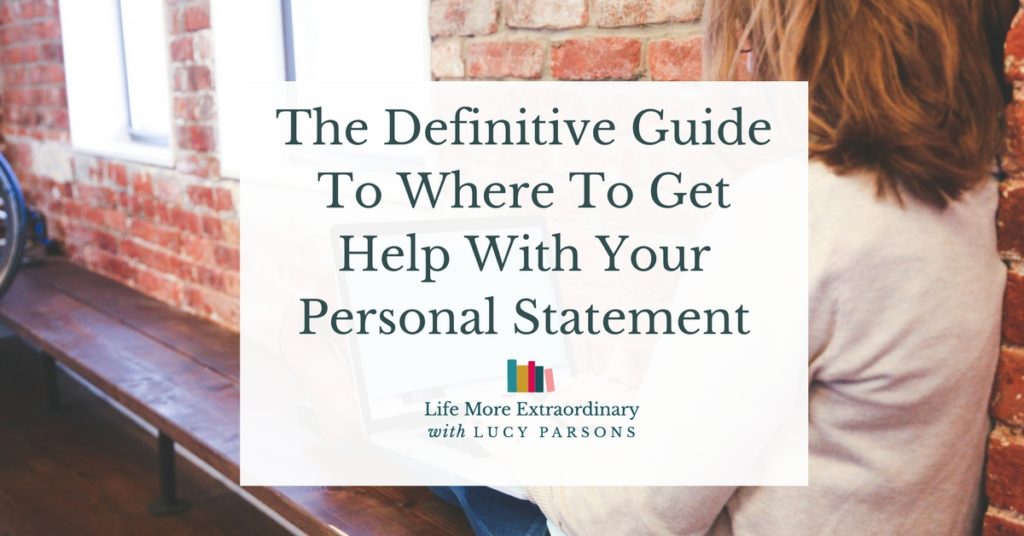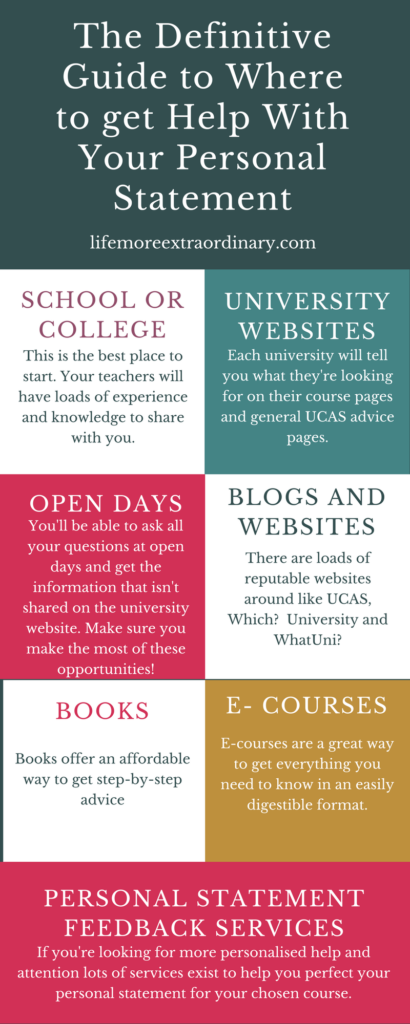The definitive guide to where to get help with your personal statement
 Writing a UCAS personal statement is a tricky and intimidating process. There's so much at stake and it's difficult to know what to put in, what to leave out, how to start it, how to structure it and how to finish it. In this article I'm aiming to give you the definitive guide on where to get help with your personal statement.
Writing a UCAS personal statement is a tricky and intimidating process. There's so much at stake and it's difficult to know what to put in, what to leave out, how to start it, how to structure it and how to finish it. In this article I'm aiming to give you the definitive guide on where to get help with your personal statement.
Where to get help with your personal statement
 Let's start with the places you really should be looking before you put pen to paper. There aren't really any excuses for not doing these – particularly for your two top choices of university.
Let's start with the places you really should be looking before you put pen to paper. There aren't really any excuses for not doing these – particularly for your two top choices of university.
1. Your school or college
The first, and easiest, place to get help with your personal statement is your school or college. All your teachers are graduates so have been through the process themselves. Your tutor and head of sixth form will also be very experienced at advising students like you on how to write their personal statement, as well as giving feedback on your drafts.
Your school or college will also have lots of resources (other than the teachers' brains) about writing personal statements. Make sure you check these out!
2. University websites
Once you've chosen which universities and courses to apply for it's a great idea to check out their advice on what to write in your personal statement. Every university is looking for something slightly different. Make sure you check out:
- Course description pages so that you know exactly what the course is about and you can highlight the experience and interests that you have that are most relevant
- General advice from the university on personal statements. This is particularly important for understanding things like the balance they want to see between academic experience and reading (which is particularly important to emphasise for Oxbridge) and extra-curricular activities (which other universities will place greater weight upon).
3. University open days
Open days are a great opportunity to dig a bit deeper than the official spiel than the website allows you to do. You'll be able to meet the admissions tutor for your course, the lecturers who will be teaching it and probably some of the students who are currently studying it. This is your chance to ask the kinds of things that aren't answered on the website and to really understand what motivates and interests the actual human beings who will be reading your personal statement.
Check out my post on whatuni.com: 9 Questions to Help You Find Out if a Course is Right For You.
Now let's look at some of the other places you can get help…
4. Blogs and websites
There are loads of big, reputable websites that give you lots of help with not only choosing universities and courses, but also with writing your personal statement. Check out these three for a start:
There's also lots of great advice on this page of my website: How to apply to university: everything you need to know.
It's also worth a general google around, as well as searching on YouTube as lots of schools, independent UCAS consultants and media organisations publish very helpful articles about how to write a personal statement.
5. Books
If you're looking for more structured advice than reading random google articles then getting a book can be a good and inexpensive option.
Here are three books that come up on Amazon on this topic. (I haven't read them so you'll need to look at the reviews to find out if they're any good. The links to these books are affiliate links so if you buy them after clicking on my links I'll get a small referral fee).
6. E-courses
Sometimes it's easier to follow videos than it is to follow written instructions. I have created a Personal Statement Masterclass, which, through a series of videos which is accompanied by a workbook takes you step-by-step through the whole university application process, in three key steps:
- Choosing the five courses you're going to apply to
- Preparing to write your personal statement by making sure you have everything that your five courses require in their candidates
- Writing your personal statement – from sifting through everything you've done, to planning a structure and the writing style it's best to use to show off your passion for your courses and your intellectual ability
One successful Cambridge applicant said:
“All of the resources inside the Personal Statement Masterclass are invaluable, I would recommend their use as they provided an excellent structure. Following the masterclass ensured that the process of writing my personal statement was efficient and ultimately successful. The advice transformed my personal statement into one that allowed me to get an offer from Cambridge!”
Find out more about my Personal Statement Masterclass here.
7. Personal statement writing and feedback services
When you google anything about how to write a personal statement you'll see google ads from people offering to write your personal statement for you or give you feedback.
I want to give you a word of warning about this. No matter how hard you're finding writing your own personal statement you should never get someone else to write it for you. It's very important that it sounds like you and is written by you. Your personal statement should give the story of why you're right for the course and what experience has brought you to this point in life.
It's also really important that your statement doesn't get picked up by UCAS's plagiarism detectors. You only guarantee that this isn't going to happen if you write it in your own authentic way.
Finally, it's simply unethical to pay someone else to write your personal statement for you.
Various people (myself included) offer feedback services on your personal statement. When you use these services you write your own best attempt at a personal statement and then get advice about the structure, feedback on the flow, find out if there's anything you should leave in or take out and whether there are any spelling or grammar errors (it's much easier for someone else to spot these as you become blind to your own work).
This is a great option if you don't feel like you're getting the personalised attention you want from your busy teachers or if your parents aren't confident about helping you through this process. But, choose the person you want to work with wisely and make sure you trust their experience and like their style.
Where are you getting help with your personal statement?
That's my list of the main places you can get help with your personal statement. It starts with the free options and works it's way up to the more expensive ways of getting help.
In the comments below, I'd love to know the best resources you've found for helping you with your personal statement please leave a link and tell me what you liked about that particular resource.
Best of luck with your university application. I know it's difficult and scary – but with the right information and tools you can do this and it'll be so worthwhile.

